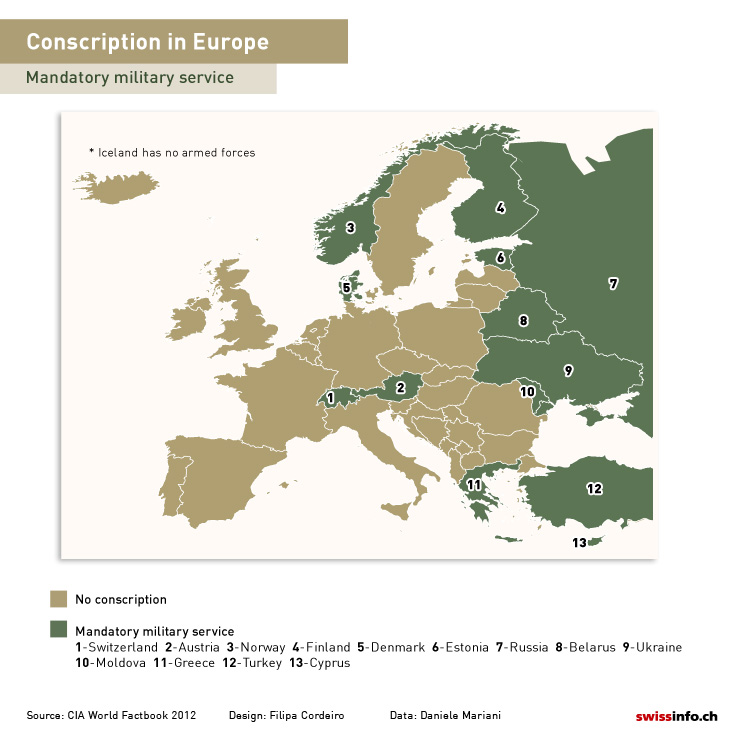
Ballot box verdicts due on army, jabs and shops

Switzerland is set to remain one of the last countries in Europe with a mandatory military service. Voters on Sunday are expected to shoot down a proposal to abolish conscription. Also on the ballot are mandatory vaccinations and extended night-time shopping.
The outcome of the vote on conscription appears to be a foregone conclusion. The latest opinion polls ahead of Sunday gives the Switzerland without an Army group – supported by the centre-left parties – just over 30 per cent of the vote.
Instead, the pacifist group wants to see the introduction of a professional army of volunteers.
Supporters of the proposal say the Swiss militia army is outdated and too expensive.
For their part, opponents argue scrapping conscription would weaken Switzerland’s defence capacity and undermine a long-standing tradition.
It is the third ballot on the army since 1989 when the group garnered more than 35 per cent of the votes, creating a major political upset in a country where the militia army has been a tenet of Swiss society.
Most countries in Europe have scrapped or suspended conscription over the past few years.
About 5.2 million citizen are eligible to take part in the nationwide votes on September 22. It is the third of four ballots this year.
About 165,000 citizens, notably Swiss expatriates, can participate online as part of ongoing trials with e-voting.
At the same time, elections and votes on a variety of issues take place at the cantonal and local level.
Neck-and-neck
The vote to centralise vaccination campaigns is expected to be a much tighter race. The Swiss are being asked to support a decision by parliament giving the government a greater say – at the expense of the cantonal authorities – on when vaccinations should be mandatory.
The government as well as most political parties argue the centralization is important in order to confront global health risks and increasing mobility more efficiently.
However, critics warn Switzerland is becoming an easy target for the pharmaceutical industry and international health organisations. A coalition of opponents, led by a holistic therapist, collected enough signatures to challenge the amended law to a nationwide vote.
The rightwing Swiss People’s Party is the only major political group supporting the opponents.

More
Going to the polls
Shops
It has been equally difficult for pollsters to predict the outcome of the vote on an extension of night-time shopping hours for some petrol station shops located along motorways and main roads in urban areas.
The move is opposed by trade unions. They are challenging the parliamentary decision to liberalise labour regulations to allow the shops in question to offer a full range of goods after hours.
The opinion poll published ten days before the vote saw the naysayers only lagging behind by a small margin. They rely on support in rural and conservative regions as well as in the French-speaking part of the country.
Those in favour of liberalisation, including most political parties and the main business associations, argue limiting the range of products on sale overnight is absurd. They are likely to win voters in urban areas and among high-income earners.
However, trade unions, centre-left parties and church groups are concerned an easing of restrictions would open the floodgates for a 24-hour, seven days a week consumer-based society.

More
Mandatory military service in Europe
Campaign
The campaigns in the weeks leading up to voting day have been low-key. Experts have criticised a lack of public debates, leaving many citizens insufficiently informed about the issues at stake.
Political scientist Claude Longchamp of the GfS Bern polling and research institute says opponents of the amended vaccination law have resorted to online campaigning to make up for a shortage of funds and political backing.
Nevertheless, turnout is expected to be around 45 per cent on Sunday – an average level in a long-term comparison.
The campaigns have also been overshadowed by issues tabled for a vote in November, notably a proposed introduction of a salary cap within companies. The initiative demands that the maximum wage at a firm may not be more than 12 times the lowest salary.
Voters decide on three separate issues:
An initiative calling for the abolition of conscription and the creation of a professional army instead.
A plan by parliament to extend opening hours of certain shops on motorways and main roads, doing away with restrictions in the labour law.
A proposal approved by parliament to give the federal authorities a greater say on vaccination campaigns.

In compliance with the JTI standards
More: SWI swissinfo.ch certified by the Journalism Trust Initiative





























You can find an overview of ongoing debates with our journalists here . Please join us!
If you want to start a conversation about a topic raised in this article or want to report factual errors, email us at english@swissinfo.ch.